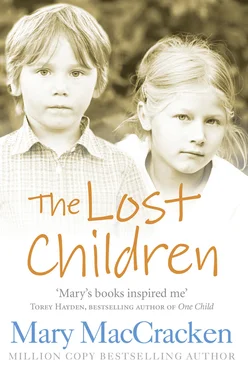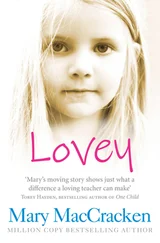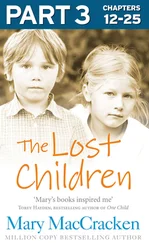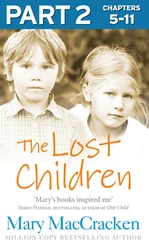“Come now – come now, little one. It is all right. Everything will be all right. I know you now; you cannot fool Helga. You are smart and you can move. You try to fool us, ja ? Lying there, sucking on your thumb. But you are smart, ja ? You know just where I hid that blanket, and when you want it enough and I do not bring it to you, then you yourself go to get it. Ja , ja , my little one, my pretty golden one, we will teach you to talk and to walk.”
Helga rocked her then and sang to her. Each morning after that, Helga greeted Sarah at the front door and carried her up the stairs herself. She did not wish to explain to Sarah’s mother what had happened to the blanket – that it now lay discarded beneath a box of old records in the recesses of the cabinet. Before long, it would disappear altogether. Dealing with parents or the public was not one of Helga’s strong points; she left that to the Director.
Sarah crawled more and more on the green linoleum in Helga’s room, gradually strengthening arms, legs, curiosity, as she explored the room. A small rag doll was her favorite toy. She would find it and play with it long hours at a time. One morning, before Sarah arrived, Helga moved the doll from the floor to the top of one of the low cabinets. Another frustrating, miserable day for all of us – worse than the first because now Sarah had a temper. She not only whimpered and whined; she screamed and kicked her heels against the floor in rage – but two days later she stood for the first time, pulling herself up until she could reach the top of the cabinet, reach her doll. And when she had it safe in one hand, balancing herself with the other to stay upright, she laughed out loud in triumph. Helga let her have her triumph, shaking her head, saying, “Ah, you, Sarah, such a girl. You are too smart for me. Too smart for old Helga. You find that doll no matter where I put it.”
From crawling to walking to climbing that long flight of stairs to Helga’s room. At first Helga stayed where she could cushion the fall if it occurred. Then, as confidence grew, she moved on ahead so that Sarah could see her there, have incentive to move ahead – not begging or pleading with the child, simply waiting, expecting her to be able to do it. And she did. Even then Helga’s praise was short – one word: “Good!” – brief, clipped: “Hang up your coat now. We’re late.”
Helga, wise, strong, letting Sarah savor the pride in her own accomplishment, not setting up a new dependency. Even the morning, many months later, when Sarah came up the whole flight, breaking away from her mother at the door, walking fast, climbing without holding on, up the stairs, up to Helga – even then her kiss on Sarah’s neck was brief, and she said only, “You’ve a lot of energy today, girl. Come and help me.” And they went together to do battle against the toilet.
Helga and I had one thing in common, and it was one of the things that made me sure that I must work under her, learn from her, rather than from another teacher. Helga and I had the same basic language. Even though our native tongues were different – she born in Germany, I in America – we both had a body language and communicated best through it, trusting it more than words. It was less tricky, more complete. It is more than merely touch: people touch each day and communicate nothing. Body language is the first language – the way the mother speaks to the child long before he can understand her words. As she holds him, bathes him, feeds him, she is telling him of love or anger or irritation. So, too, Helga spoke to her seriously emotionally disturbed children, many of whom had rejected verbal communication, and they listened to this body language. Most of her touching was light and firm and quick. She used it to communicate affection, support, pride in the child; usually she touched the back, shoulders, arm, or head; she used it alone or with a few simple words. She also used another kind of touching. It was really more holding. It said in effect, “I am here. We will survive.” She reacted this way during violence, when a child tried to kick her or bite himself – holding him, restraining him from the destructive act and at the same time comforting him with the solidness of her body. When violence explodes inside a child, all things seem unreal, and the solid strength and warmth of another human being who is not driven away or shattered by it makes the terror more controllable.
Never, however, did she use this body language to express her own anger or irritation. Striking a child may cause him to become fearful of your touch, and this is too valuable a tool to lose, too high a price to pay for momentary frustration. Instead, Helga swore. She cursed as I had never heard a woman do before, and it seemed to harm the children not at all.
If I do not remember when she first addressed me directly, I do remember when she first called me by name.
It was in the spring of that first year, more like summer really although the official date had not arrived. Yellow daffodils had already flooded the hills and fields where we had sailed our kite. Nick, our one male teacher, had put up swings under two of the apple trees, and whenever we could we took the children there in the late morning to play and relax before lunch.
I was pushing Chris on a swing – pushing him from in front instead of from behind so that I could see his face while I played with him. A small game had developed between us: he would straighten and stiffen his legs as the swing approached me, and then laugh out loud as his feet hit my hands and I pushed against them, sending him arcing gently back. Helga had taken the other three children to play some sort of game with Nick’s group. Since Chris was not very good at games, always running, hitting, biting, Helga had stated, “It is a good day for a swing for Chris,” and I had known I was to do this. I loved being with Chris anyway – his very stubbornness fascinated me. Bright as a button, he refused to speak a word; perfectly toilet-trained for months now, he would deliberately pee on the Director’s foot when she brought visitors to our room for “public relations.” She handled it well, though, not even blanching as the brown leather of her shoe turned slowly darker and a puddle formed around it as Chris stood still, looking out the window, smiling, with her hand stroking his head.
In any event, I was totally absorbed in my game with Chris and, thinking we were alone, had even started hamming it up a little as I had with my own children, making funny faces, pretending to be knocked backward when his feet hit my hands. I thought he was beginning to say something: was it “More” – “Mo, mo”? I had not heard footsteps, and was startled when I felt a hand on my arm. I turned quickly. Unexpectedly, Helga was standing beside me.
“Mary,” she said, calling me by name for the first time, “these are for you.” She stretched out her hand toward me and it was full of small wild strawberries. We ate them there together, standing in the sun, sharing the sharp, sweet taste, the grittiness. Since then I have been given many other gifts and some honors, but none has meant more to me than this. Helga had acknowledged me; I was sure then that I could teach.
I worked even harder the remainder of that year with Helga. I canceled my Tuesday bridge and my Thursday afternoon tennis foursome and went three days a week to school rather than two.
From the time Elizabeth and Rick had entered school I had always worked as a volunteer, either at the hospital on the library cart or in the county shelter for adolescents. There was strong tradition in our family for community volunteer and board work, and I had always enjoyed it. But the school was different. I had worked at the hospital and the shelter because it had seemed part of a responsible way of living. I worked now at the school because I loved it and couldn’t stay away.
Читать дальше












